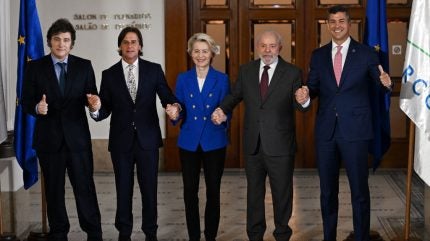
Negotiations for a free trade agreement between Mercosur and the European Union (EU) started in 1999. Twenty-five years later in Montevideo, Uruguay, EU Commissioner Ursula Von der Leyen sealed the deal with the heads of state of the participating Latin American countries.
The Southern Common Market (Mercosur) is a major South American trade bloc made up of Argentina, Brazil, Paraguay, Uruguay and, since 2024, Bolivia.
The agreement would create one of the world’s biggest free trade zones, covering an area with over 700m people. According to the European proponents of the deal, it would eliminate about $4.26bn in duties per year.
The deal would reduce tariffs between the trading partners and further liberalize Europe’s agricultural sector, which has traditionally benefitted from EU protections. It will facilitate the entry of European industrial goods such as automobiles and machinery into Latin America. It will also allow Europe more access to Mercosur’s public procurement market, high-value sectors and critical raw minerals like lithium.
If Von der Leyen manages to get the deal through the necessary ratifications, it would be a major political win for her. Germany welcomes the agreement. Given the decline of its legacy automotive industry, it is eager to expand its export-led economy to new markets.
The biggest opponent is France, where leaders have tried to derail and block the deal for years. Opposition stems from France’s agricultural sector, where farmers fear that an influx of cheaper South American goods, which they say would not be subject to the same health and environmental regulations, would be deeply damaging.
How well do you really know your competitors?
Access the most comprehensive Company Profiles on the market, powered by GlobalData. Save hours of research. Gain competitive edge.

Thank you!
Your download email will arrive shortly
Not ready to buy yet? Download a free sample
We are confident about the unique quality of our Company Profiles. However, we want you to make the most beneficial decision for your business, so we offer a free sample that you can download by submitting the below form
By GlobalDataPoland and Ireland also oppose the deal. Polish Prime Minister Donald Tusk highlighted that while these three countries may not be sufficient to block the dela, “if we had Italy on our side, we would probably have a blocking minority.”
The minority opposition will now try to tip a wavering Italy to their side, given it would them enough political weight to kill the deal.
“Signing can only take place subject to adequate safeguards and compensation in case of imbalances for the agricultural sector,” an Italian government official said in a statement.
While political negotiations have been finalised, the specific text will be revealed this week. The deal then needs to undergo legal checks and translations. It also needs to be ratified by all EU member states, although the commission could bypass this ratification and split it from the political and cooperation pillar of the process.



